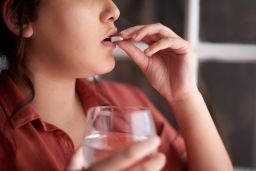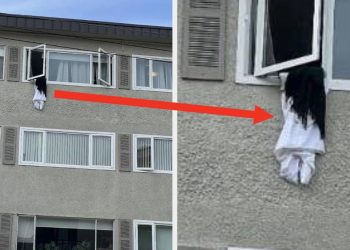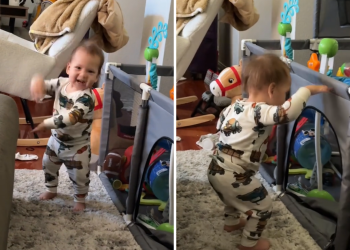CNN
—
At some middle and high schools in the United States, 1 in 4 teens report they’ve abused prescription stimulants for attention deficit hyperactivity disorder during the year prior, a new study found.
“This is the first national study to look at the nonmedical use of prescription stimulants by students in middle and high school, and we found a tremendous, wide range of misuse,” said lead author Sean Esteban McCabe, director of the Center for the Study of Drugs, Alcohol, Smoking and Health at the University of Michigan in Ann Arbor.
“In some schools there was little to no misuse of stimulants, while in other schools more than 25% of students had used stimulants in nonmedical ways,” said McCabe, who is also a professor of nursing at the University of Michigan School of Nursing. “This study is a major wake-up call.”
Nonmedical uses of stimulants can include taking more than a normal dose to get high, or taking the medication with alcohol or other drugs to boost a high, prior studies have found.
Students also overuse medications or “use a pill that someone gave them due to a sense of stress around academics — they are trying to stay up late and study or finish papers,” said pediatrician Dr. Deepa Camenga, associate director of pediatric programs at the Yale Program in Addiction Medicine in New Haven, Connecticut.
“We know this is happening in colleges. A major takeaway of the new study is that misuse and sharing of stimulant prescription medications is happening in middle and high schools, not just college,” said Camenga, who was not involved with the study.
Published Tuesday in the journal JAMA Network Open, the study analyzed data collected between 2005 and 2020 by Monitoring the Future, a federal survey that has measured drug and alcohol use among secondary school students nationwide each year since 1975.
In the data set used for this study, questionnaires were given to more than 230,000 teens in eighth, 10th and 12th grades in a nationally representative sample of 3,284 secondary schools.
Schools with the highest rates of teens using prescribed ADHD medications were about 36% more likely to have students misusing prescription stimulants during the past year, the study found. Schools with few to no students currently using such treatments had much less of an issue, but it didn’t disappear, McCabe said.
“We know that the two biggest sources are leftover medications, perhaps from family members such as siblings, and asking peers, who may attend other schools,” he said.
Schools in the suburbs in all regions of the United States except the Northeast had higher rates of teen misuse of ADHD medications, as did schools where typically one or more parent had a college degree, according to the study.
Schools with more White students and those who had medium levels of student binge drinking were also more likely to see teen abuse of stimulants.
On an individual level, students who said they had used marijuana in the past 30 days were four times as likely to abuse ADHD medications than teens who did not use weed, according to the analysis.
In addition, adolescents who said they used ADHD medications currently or in the past were about 2.5% more likely to have misused the stimulants when compared with peers who had never used stimulants, the study found.
“But these findings were not being driven solely by teens with ADHD misusing their medications,” McCabe said. “We still found a significant association, even when we excluded students who were never prescribed ADHD therapy.”
Data collection for the study was through 2020. Since then, new statistics show prescriptions for stimulants surged 10% during 2021 across most age groups. At the same time, there has been a nationwide shortage of Adderall, one of the most popular ADHD drugs, leaving many patients unable to fill or refill their prescriptions.
The stakes are high: Taking stimulant medications improperly over time can result in stimulant use disorder, which can lead to anxiety, depression, psychosis and seizures, experts say.
If overused or combined with alcohol or other drugs, there can be sudden health consequences. Side effects can include “paranoia, dangerously high body temperatures, and an irregular heartbeat, especially if stimulants are taken in large doses or in ways other than swallowing a pill,” according to the Substance Abuse and Mental Health Services Administration.
Research has also shown people who misuse ADHD medications are highly likely to have multiple substance use disorders.
Abuse of stimulant drugs has grown over the past two decades, experts say, as more adolescents are diagnosed and prescribed those medications — studies have shown 1 in every 9 high school seniors report taking stimulant therapy for ADHD, McCabe said.
For children with ADHD who use their medications appropriately, stimulants can be effective treatment. They are “protective for the health of a child,” Camenga said. “Those adolescents diagnosed and treated correctly and monitored do very well — they have a lower risk of new mental health problems or new substance use disorders.”
What parents and caregivers can do
The solution to the problem of stimulant misuse among middle and high school teens isn’t to limit use of the medications for the children who really need them, McCabe stressed.

“Instead, we need to look very long and hard at school strategies that are more or less effective in curbing stimulant medication misuse,” he said. “Parents can make sure the schools their kids attend have safe storage for medication and strict dispensing policies. And ask about prevalence of misuse — that data is available for every school.”
Families can also help by talking to their children about how to handle peers who approach them wanting a pill or two to party or pull an all-night study session, he added.
“You’d be surprised how many kids do not know what to say,” McCabe said. “Parents can role-play with their kids to give them options on what to say so they are ready when it happens.”
Parents and guardians should always store controlled medications in a lockbox, and should not be afraid to count pills and stay on top of early refills, he added.
“Finally, if parents suspect any type of misuse, they should contact their child’s prescriber right away,” McCabe said. “That child should be screened and assessed immediately.”



















